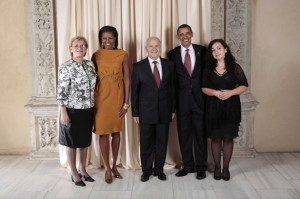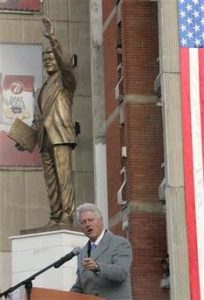SAN FRANCISCO — The President of Kosovo, Dr. Fatmir Sejdiu, likes to say that he is the head of the world’s youngest state, but after nearly two years of nominal independence for his country, this is a statement with an asterisk.
Independence was declared by Kosovo on February 17, 2008, but recognition is still a work in progress. While all the other non-Serbian members of what was once Yugoslavia — Slovenia, Croatia, Bosnia, Montenegro and Macedonia — have been independent now for years, the entity of Kosovo continues to struggle — using words, not guns — against what was once the hub of the Yugoslav state. With 90 per cent of its population ethnic Albanian, and less than ten per cent Serb, Kosovo was rescued ten years ago by the United States and NATO from a military assault from Serbia aimed at ethnic cleansing; now Kosovo is trying to form a state.
Today I interviewed President Sejdiu, 58, a former law professor, during a brief visit by him to the United States. As we sat down in his hotel suite overlooking the city of San Francisco, word arrived that Mauritania had officially become the 65th country to recognize the Republic of Kosova (Kosovo’s official title), leaving 127 members of the United Nations yet to take this step.
“Recognition and UN membership would settle down all the artificial tensions and cut Serbia’s illusions of impeding

President Sejdiu and Friends
the development of Kosovo,” Sejdiu said. “We can do our part [to gain more support], but so can the other countries who have already recognized Kosovo do more to influence those who have not yet done so.”
Serbia, of course, heads the list of states opposing independent Kosovo, but there are some states holding back recognition who have little sympathy for Serbia’s behavior during the last decade of the Twentieth Century. States like Spain, Ukraine, or Romania, who worry that recognizing Kosovo will not only irritate Belgrade but encourage separatists at home. This is “very unjust,” in Sejdiu’s view, since the former Yugoslavia was a federation that, once dissolved, left all constituent parts free to decide their own destiny. “The internal issues [of other European states] cannot be compared to Kosovo and its history,” he says.
As a result, the Latin legal phrase sui generis — applied by UN mediator Martti Ahtisaari to describe Kosovo not being a precedent — is a constant part of President Sejdiu’s vocabulary as he makes speeches before groups like the World Affairs Council of Northern California.
There are other, unfortunate, ways in which Kosovo is sui generis — unique, or nearly so. With a presence of some 12,000 foreign troops from NATO member states, and an EU-appointed administrator, Kosovo exercises control over only 80 per cent of the goods crossing its frontier. Corruption and crime are serious threats and, says Sejdiu, the country loses 5 million Euros per month from graft and theft. “This is a lot for a country our size,” he notes, in a remarkable understatement.

Last November, in Kosovo, on Clinton Boulevard, the man and his statue
Moreover, Belgrade has established what Sejdiu calls “parallel structures” — including courts — in the northernmost part of Kosovo in an effort to pressure local Serbs to resist integration into Kosovo. President Sejdiu told me that Belgrade had spent 235 million Euros in 2008 and again in 2009 to support these parallel institutions. NATO forces do not interfere.
This tense standoff occasionally gets punctuated by unexpected visits. Last week, Serbian President Boris Tadić helicoptered in to Kosovo to visit Dečani, a Serbian monastery, on the occasion of Othodox Christmas. “Tadić planned this visit to Kosovo on this specific date just to destroy the visit of the President of Croatia [Stjepan Mesić] who was on an official visit to Kosovo the same day,” Sejdiu charged.
Sejdiu’s view of his Serbian counterpart is icily critical. “Although Tadić gained power on the basis of more liberal politics, he has not proved to be such a [liberal] politician,” he said. “We wanted to believe that he had the power to change the situation, but so far he has not done so. He has not handed over the war criminals. He knows where Mladić is hiding and has known for quite some time.”
The Kosovar President reflected on the difference between the view of Croatia toward Croats living in Bosnia-Herzegovina and the way Belgrade views Serbs living in Kosovo.
“I recall something that impressed me a lot when President Mesic visited Pristine [Kosovo’s capital],” President Sejdiu says. “Mesic referred to a statement made by him to Croats when he visited Bosnia, saying ‘Your homeland is Bosnia.’ We have never heard a politician from Serbia say the same thing with respect to Kosovar Serbs. They should be saying that so local Serbs [in Kosovo] can really love Kosovo. Because our offer to Serbs is very generous.”
For all its existential problems, Kosovo is not a failed state — not a state like Yemen or worse, Somalia — states that have known an existence and then fallen into disorder. In its favor: a unique and cohesive Albanian-language culture that includes strains of Islam and Christianity (Catholicism and Orthodoxy) that co-exist in a secular state. The Serbian minority in Kosovo, apart from the area near Mitrovica in the north, appears to have accepted Pristine-based institutions. Under the Kosovar constitution, these Serbs are guaranteed a disproportionately high number of seats in the country’s parliament and use of Serbian as an official language. No law may be passed without the approval of two-thirds of the ethnic Serb parliamentarians.
Kosovo has to fully exist before it can be said to have failed. And for it to fully exist it will require an international community that invites it to participate fully in international organizations such as the United Nations, the OSCE and eventually the EU.
Until then, the world’s youngest state is on the sidelines, counting its supporters and counting on support. So far, the count is 65.